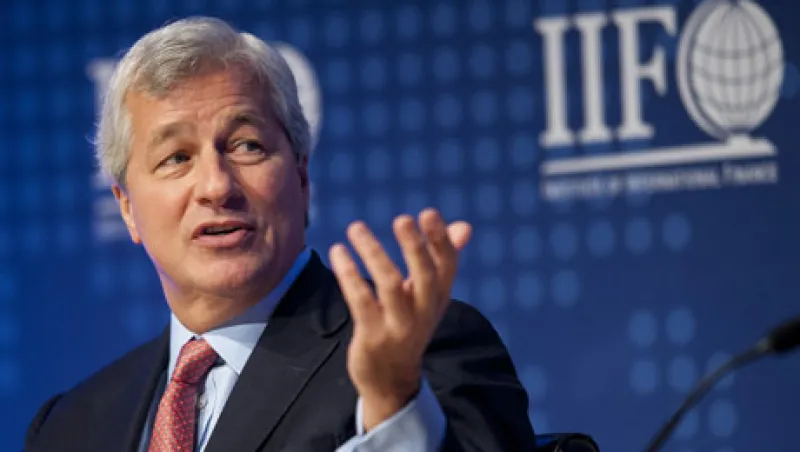It’s not often that someone in the financial industry publicly rebukes Jamie Dimon. But at a major gathering of international financiers this past weekend, a leading Singaporean banker chastised the JPMorgan Chase & Co. chairman and chief executive for dismissing the bank’s critics and focusing single-mindedly on shareholder returns.
The clash took place at a panel discussion on the future of the universal banking model at the Institute of International Finance (IIF), an association of global banks and financial services firms, in Washington, D.C. Dimon used the occasion to offer a full-throated defense of big-ticket banking, peppering the packed house with a flurry of combative rhetorical thunderbolts.
“The financial system is big and complex,” he said. “You can’t just make it small and simple because you want it to be.” Dimon dismissed the postcrisis backlash against the banking system as misguided and uninformed, adding, “Our clients and shareholders are very happy with us, but we’ve started this narrative that people hate banks. I can’t change that. It’s very easy to create narratives. We’re going to continue serving our clients and serving our country.”
Dimon has publicly elaborated these themes on many occasions, but the bravura performance drew hoots and hollers of support from a crowd of international bankers at the Ronald Reagan Building and International Trade Center, where the IIF held its annual membership meeting to coincide with the annual meetings of the International Monetary Fund and World Bank. Dimon stressed the good that large banks like JPMorgan do for clients and shareholders — and, by extension, for society — over what he sees as popular misperceptions of chronic malfeasance within the financial industry. A deal like last month’s record $49 billion bond offering by Verizon, which J.P. Morgan helped manage, would not be possible without big banks, Dimon said. “Small regional banks simply can’t absorb a deal of that size.” (Read more: “At IMF, Officials Warn of Major Fallout from U.S. Debt Debate”)
Other members of the panel, which included Anshu Jain, co-CEO of Deutsche Bank, and Baudouin Prot, chairman of BNP Paribas, agreed, even as they stressed the need to restore public trust in the financial system. “The fundamental contract between banks — I would say financial services perhaps, even — and society stands bruised, perhaps broken,” Jain said. “That broken trust is a vital asset which is missing from our balance sheets.”
But not every global banking executive agreed with Dimon’s assertion that serving clients and extracting value for shareholders are the paramount objectives of large global financial institutions. Speaking on a panel later in the day, Piyush Gupta, CEO of Singapore-based DBS Bank, made a point of singling out Dimon’s remarks for criticism. Banks, Gupta said, receive “a license to operate not from the government but from civil society at large. Just saying we’re keeping our shareholders and clients happy isn’t good enough.” Income inequality and “vast concentrations of wealth” are looming as “the single greatest policy issue of our time,” he contended. Unless banks engaged “multiple stakeholders” beyond the restricted and privileged realm of corporate clients and shareholders and promoted a system of “inclusive finance,” the trust deficit between banks and the rest of society would only increase. “There’s a greater responsibility,” he said.
Gupta noted that most banks in advanced economies have lowered their shareholder return targets to roughly 12 percent to 15 percent today from an average of 18 percent to 22 percent before the financial crisis. “That moderation is a recognition that maximizing returns to shareholders is not only not tenable but perhaps not optimal for the system,” he argued.
Gupta didn’t propose any alternative metric by which to measure the performance of banks such as his, which surely still have profit generation as their primary raison d’être, but there’s no doubt that the idea of banks’ needing to engage with “multiple stakeholders” in a meaningful way has significant purchase in the emerging markets.
“Maybe Jamie Dimon’s views are valid for the advanced economies, but for the emerging markets, banks can never operate in isolation — we are part of a larger society, and we reflect a broad network of interdependencies,” Phillips Oduoza, CEO of United Bank for Africa, one of Nigeria’s largest banks, told Institutional Investor on the sidelines of the IIF conference. “We believe banks should play a role in the broader economic development of any environment in which they operate.”
As part of its efforts to engage with a broader array of stakeholders, Oduoza said, UBA recently collaborated with the Nigerian government to offer agricultural loans at subsidized, single-digit rates in circumstances in which commercial rates would have been closer to 20 percent. “In the emerging world, the banks don’t have any choice but to engage with society,” he said. “Yes, the profit motive is very important, but there are so many other things that need to be taken into consideration in lending and our other core activities.”
Other emerging-markets bankers attending the Washington meetings adopted a more humble, less confrontational approach about the role of banks in today’s society. “I can understand that an average person cannot accept the idea that a banker-CEO is paid $10 million, especially in times of real economic crisis,” Sandor Pataki, head of investor relations at OTP Bank, Hungary’s largest bank, told II. “Sometimes I feel uncomfortable that my salary is, say, ten times that of a surgeon or a teacher. Am I really doing that much more of an important job?”
Bankers from emerging and advanced economies did express agreement on at least one major point. “We need to eliminate ‘too big to fail,’?” Dimon said. “We all know that.” Jain concurred but added an important caveat: with growth in the advanced economies, especially in Europe, remaining depressed, the authorities need to do everything possible to ensure that banks remain “the primary agents of credit creation” while continuing to foster the development of capital markets as sources of corporate financing. Shrinking the banks, he effectively argued, would undermine efforts to boost economic growth. Combined with Dimon’s point about the dependence of large corporations like Verizon on large banks, this line of argument contained no small amount of irony: the big banks all agree that “too big to fail” needs to end, but they themselves don’t want to be any smaller.
Meanwhile, regulatory authorities appear focused on efforts to build an international framework for resolving troubled banks in danger of failure. “I think U.S. authorities could do it today — and I mean today,” Paul Tucker, deputy governor of the Bank of England, told an IIF panel. The challenge is to get all major jurisdictions up to speed so that regulators can coordinate and smoothly resolve a major global bank with complex cross-border connections. “A global financial system will not survive if we don’t crack this problem.”
The Federal Deposit Insurance Corp. is close to finalizing agreements with authorities in China, Switzerland, Germany and Japan on how the cross-border liquidation of a failing global bank would work, the agency’s chairman, Martin J. Gruenberg, said in a speech Sunday in Washington. The FDIC has already reached an agreement with U.K. authorities that adopts a “single point of entry” strategy under which authorities would assume control of the bank holding company, impose losses on shareholders and allow healthy subsidiaries to continue operating. “We are prepared,” Arthur J. Murton, director of the Office of Complex Financial Institutions at the FDIC, told the IIF conference, although he added that authorities will be more prepared in a year.
Establishing clear resolution authority is an essential element to restoring confidence in the system, said Jain. “People are not going to trust banks if they feel that we continue to socialize our losses and walk away when things blow up,” he explained. The attention of financial institutions and their regulators in the advanced economies appears firmly trained on how to insulate society from the effects of banks when they go bad. But in the emerging world, the conversation is focused more on what banks can do to ensure that more of society shares in prosperity when times are good.
Attracting greater global attention to that issue may prove difficult, however. The IIF conference concluded with a session on “inclusive growth,” which examined what banks can do to ensure capital reaches the least-privileged sectors of society. The panel played to a largely empty room.
Read more in Banking & Capital Markets.







